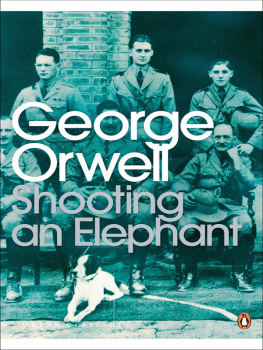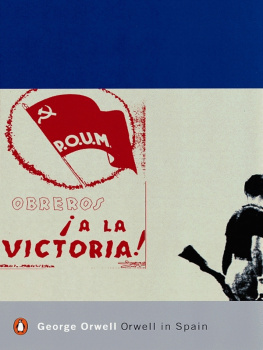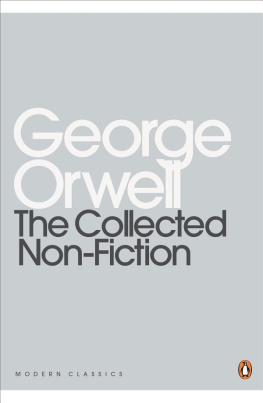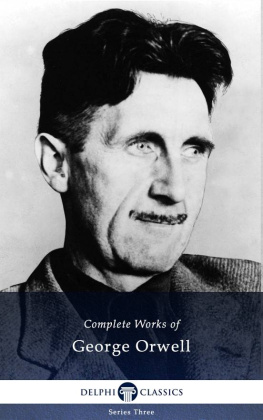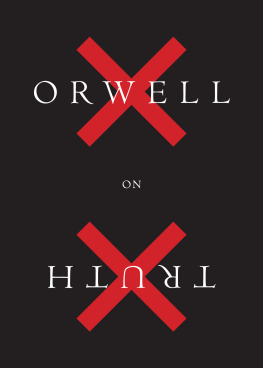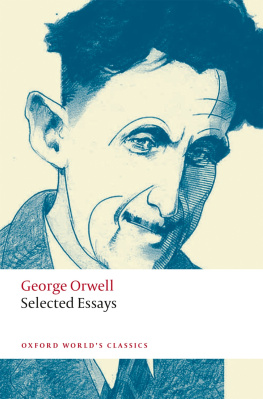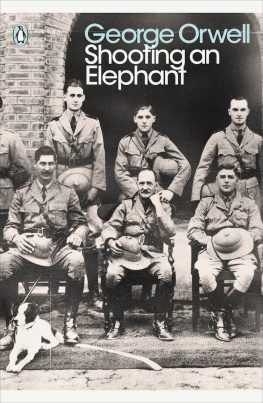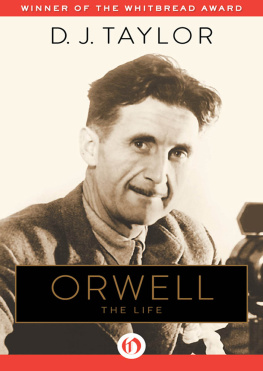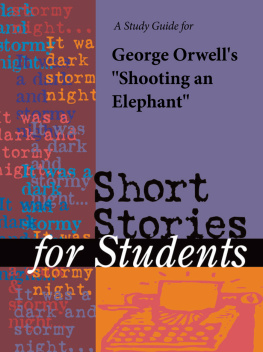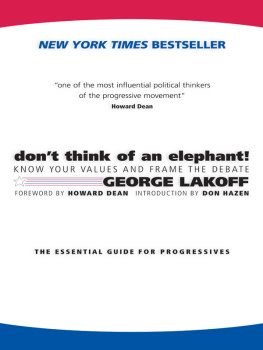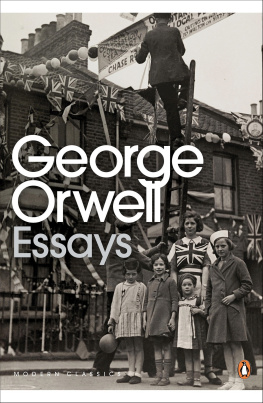GEORGE ORWELL
Shooting an Elephant and Other Essays
with an Introduction by Jeremy Paxman

PENGUIN BOOKS
PENGUIN MODERN CLASSICS
Shooting an Elephant
George Orwell (whose real name was Eric Arthur Blair) was born in 1903 in India and then went to Eton when his family moved back to England. From 1922 to 1927 he served with the Indian Imperial Police in Burma, an experience that inspired his first novel, Burmese Days (1934). He lived in Paris before returning to England, and Down and Out in Paris and London was published in 1936. After writing The Road to Wigan Pier and Homage to Catalonia (his account of fighting for the Republicans in the Spanish Civil War), Orwell was admitted to a sanatorium in 1938 and from then on was never fully fit. He spent six months in Morocco where he wrote Coming Up for Air. During the Second World War Orwell served in the Home Guard and worked for the BBC. His political allegory Animal Farm was published in 1945 and it was this novel, together with Nineteen Eighty-Four (1949), which brought him worldwide fame. George Orwell was taken seriously ill in the winter of 19489 and died in London in 1950.
Jeremy Paxman is a journalist and writer.
Introduction
If you want to learn how to write non-fiction, Orwell is your man. He may be known worldwide for his last two novels, Animal Farm and Nineteen-Eighty Four. But, for me, his best work is his essays.
Who would have imagined that sixteen hundred words in praise of the Common Toad, knocked out to fill a newspaper column in April 1946, would be worth reprinting sixty years later? But here it is, with many of the characteristic Orwell delights, the unglamorous subject matter, the unnoticed detail (a toad has about the most beautiful eye of any living creature) the baleful glare, the profound belief in humanity. Because what the piece is really about, of course, is not the toad itself, but the thrill of that most promising time of year, the spring, even as seen from Orwells dingy Islington flat.
When he produced articles like this, hair-shirted fellow socialists got cross. Why wasnt he spending his time promoting discontent, denouncing the establishment, glorifying the machine-driven future? It is a mark of his greatness that Orwell didnt care. They whoever they might be cannot stop you enjoying spring. The essay ends, The atom bombs are piling up in the factories, the police are prowling through the cities, the lies are streaming from the loudspeakers, but the earth is still going round the sun, and neither the dictators nor the bureaucrats, deeply as they disapprove of the process, are able to prevent it.
It all reads so effortlessly. And yet it cannot have been produced without toil. He tells us in Why I Write that he found writing a book a horrible, exhausting struggle, like a long bout of some painful illness and even the shorter pieces, knocked out for magazines or newspapers, must often have been a chore. There is the research, for one thing. His generous, insightful analysis of Charles Dickens shows not merely a close familiarity with thirteen of his novels, but also with those of Trollope, Thackeray and a host of long-forgotten writers, too. For his caustic piece on Boys Weeklies he evidently immersed himself in mountains of the things.
The result of this steeping is a piece so deft and witty that the result has you laughing out loud. Here, for example, is his list of the national characteristics of the foreigners who make occasional appearances in this bizarre genre:
FRENCHMAN: Excitable. Wears beard, gesticulates wildly.
SPANIARD, MEXICAN, etc.:Sinister, treacherous.
ARAB, AFGHAN, etc.: Sinister, treacherous.
CHINESE:Sinister, treacherous. Wears pigtails.
ITALIAN: Excitable. Grinds barrel-organ or carries stiletto.
SWEDE, DANE, etc.:Kind-hearted, stupid.
NEGRO:Comic, very faithful.
How one longs for him to have lived long enough to be let loose on the lads mags culture of the early twenty-first century.
Because something paradoxical has happened to us. The abundance of the mass media offers a greater choice than ever before. We are adrift in a sea of newspapers, magazines, radio, television and the limitless extremities of cyberspace. It is not merely that the more there is of it, the less any individual part of it matters. It is that so little of it seems intended to have any meaning. The mechanical processes of printing and broadcasting seem somehow to have been applied to the generation of content, too. To take one small example; no one ever experiences inconvenience as a result of motorway traffic jams or a broken-down train. Instead they invariably, meaninglessly suffer misery. They have not, of course. It is just that that is the word the mental function key brings up when someone is required to write about disruption on the transport system.
Orwell is the enemy of laziness, vagueness and staleness. His 1946 essay, Politics and the English Language remains the best starting point for anyone hoping to achieve the deceptively hard task of clear communication. He boils the business down to five instructions:
- Never use a metaphor, simile, or other figure of speech which you are used to seeing in print.
- Never use a long word where a short one will do.
- If it is possible to cut a word out, always cut it out.
- Never use the passive where you can use the active.
- Never use a foreign phrase, a scientific word, or a jargon word if you can think of an everyday English equivalent.
- Break any of these rules sooner than say anything outright barbarous.
He might have added for it was certainly true in his case that it also helps not to have had your head cluttered, your voice strangulated and your writing hand swathed in bandages by attending one of our finer universities.
You will find nothing much here about fashion, Westminster politics, gossip, relationships, must-have gadgets and holidays, not a mention of the hints dropped by payroll propagandists, nor a word from anonymous sources close to some soon-to-be forgotten minister, and nothing at all about television, pop music, or most of the other subjects which enable our increasingly feeble newspapers to trail their ink across page after page.
What you will find, instead, is an abundance of everything from the life of a book reviewer to how it is to watch a man hanged. The impeccable style is one thing. But if I had to sum up what makes Orwells essays so remarkable it is that that they always surprise you. Sometimes it is the choice of subject matter: how many journalists can write with any authority on what it is like to queue to be let into an overnight shelter for the homeless? More often, its the totally unexpected insight. He can write a sixty-page essay on Charles Dickens which frequently seems to be tending to a conclusion that he was a sentimental old fool, but then come to an unexpectedly affectionate final judgement. You have travelled with him on his journey and are rather startled, and pleased, to discover where you have ended up.
The Dickens essay was an attempt to worry away at why he was such a successful writer and is the longest in this collection. But it is infused with the same spirit of personal engagement as everything else. It is that amazing ability to make you believe that you would have felt as he felt that is his genius. Take Shooting an Elephant, which recounts an incident during his time as a policeman in Burma. It is a remarkable piece. There is, firstly, the language. When he first sees the elephant, which is said to have run amok, it is standing, beating a bunch of grass against its knees, with that preoccupied grandmotherly air that elephants have. In the seconds after pulling the trigger the beast remains standing, but a mysterious, terrible change had come over the elephant every line of his body altered He looked suddenly stricken, shrunken, immensely old. Then the elephant sags to its knees, its mouth slobbering. And, the utterly perfect sentence: An enormous senility seemed to have settled upon him.

